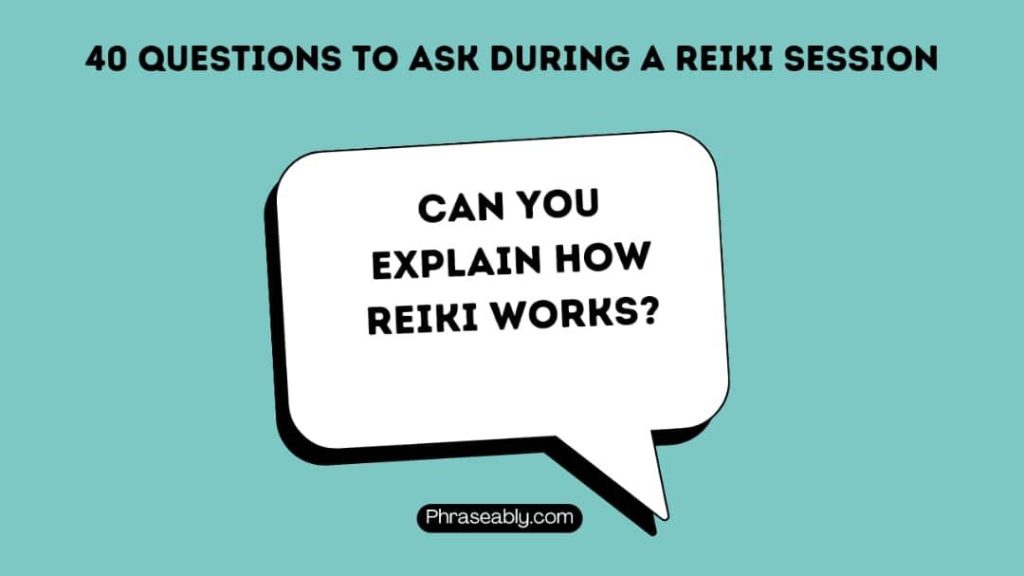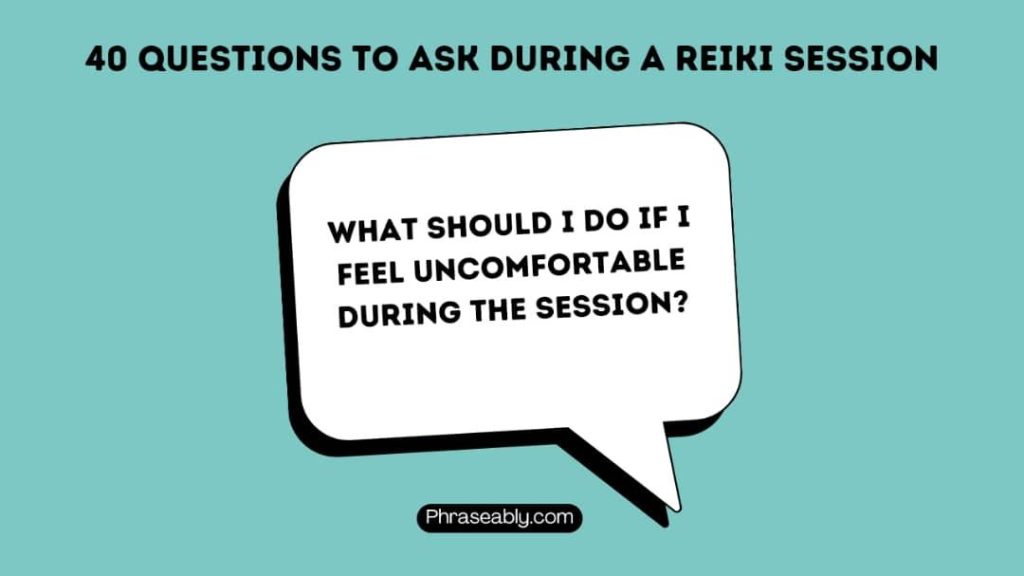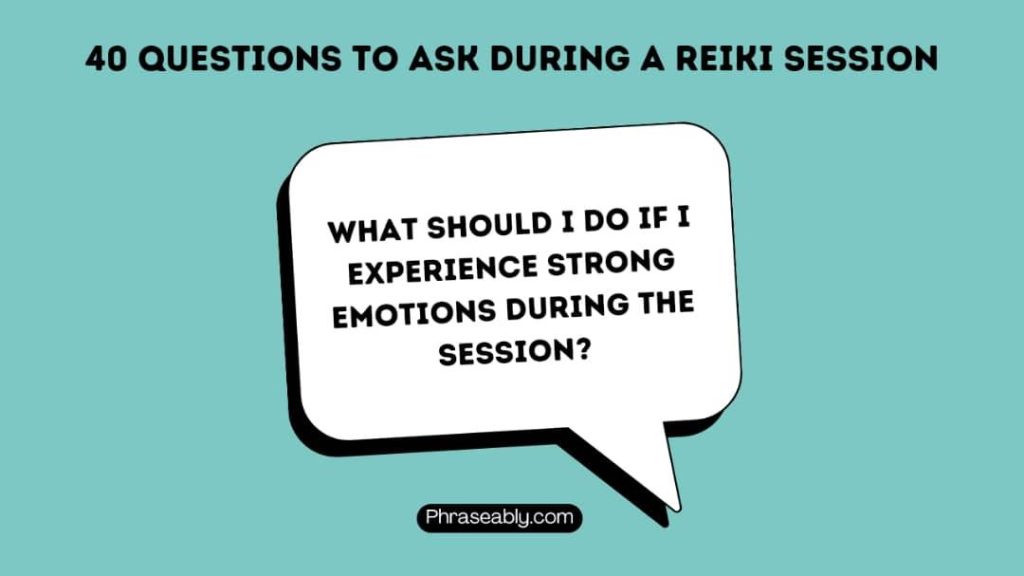Reiki is a profound energy healing practice that promotes relaxation, reduces stress, and enhances overall well-being.
Whether you’re new to Reiki or a seasoned practitioner, the questions you ask during a session can significantly impact the experience.
Thoughtful inquiries can help you connect more deeply with your practitioner, gain insights into your healing journey, and maximize the benefits of the session.
Therefore in this article, I will explore 40 insightful questions to ask during a Reiki session.
Each question is accompanied by practical usage examples and scenarios to illustrate how you can apply these inquiries during your sessions.
Whether you seek clarity, healing, or simply a deeper understanding of Reiki, these questions will empower you to make the most of your session.
40 Questions to Ask During a Reiki Session
- What should I expect during my Reiki session?
- How should I prepare for the session?
- Can you explain how Reiki works?
- What are the benefits of Reiki?
- How can I set an intention for this session?
- What should I do if I feel uncomfortable during the session?
- Can Reiki help with specific physical or emotional issues?
- How long will the session last?
- What do the different hand positions mean?
- How often should I have Reiki sessions?
- Can Reiki complement other forms of treatment?
- How will I feel after the session?
- What is the significance of the symbols used in Reiki?
- Can I focus on more than one intention during the session?
- How do you sense and work with energy during a session?
- Is there anything I should avoid before or after the session?
- How can I enhance the effectiveness of my Reiki session?
- What should I do if I experience strong emotions during the session?
- How does distance Reiki work?
- What is the role of chakras in Reiki healing?
- Can I combine Reiki with meditation?
- How can I maintain the energy balance after the session?
- What kind of feedback will I receive after the session?
- Can I share my personal experiences during the session?
- What should I do if I don’t feel anything during the session?
- How can I tell if the session was effective?
- Can I bring crystals or other healing tools to the session?
- What are some common sensations during a Reiki session?
- How does Reiki help with stress and anxiety?
- Can I ask for Reiki to focus on a specific area of my body?
- How do I integrate the insights gained from my Reiki session into my daily life?
- Is it normal to experience emotional release during or after a session?
- How do I know if my chakras are balanced?
- What is the significance of the sensations I felt during the session?
- How can Reiki support my spiritual growth?
- Should I follow up with another session soon?
- What do you notice about my energy during this session?
- How can I continue my healing journey outside of Reiki sessions?
- Is there a specific area or aspect of my life that needs more attention?
- What can I expect as I continue with Reiki?
1. What should I expect during my Reiki session?
This question helps set the tone for your session by providing an overview of what will happen. It’s especially useful for newcomers who may be unfamiliar with the process.
Usage:
If you’re attending your first Reiki session, you might ask, “What should I expect during our time together?” This opens up the conversation, allowing the practitioner to explain the flow of the session, from the initial conversation to the hands-on energy work.
2. How should I prepare for the session?
Understanding how to prepare mentally, physically, and emotionally can enhance the effectiveness of your Reiki session. Your practitioner might suggest specific practices such as meditation, hydration, or setting intentions.
Usage Example:
Before your session, you could ask, “Is there anything specific I should do to prepare?” This can lead to advice such as drinking plenty of water or taking a few moments to meditate and center yourself before the session begins.
3. Can you explain how Reiki works?

This is a great question to ask if you’re new to Reiki or want to deepen your understanding of the energy healing process. Your practitioner can explain the principles behind Reiki and how it channels energy for healing.
Usage:
During your first meeting, you might ask, “Can you explain how Reiki works and what the energy flow feels like?” This can help demystify the process and make you feel more comfortable during the session.
4. What are the benefits of Reiki?
Asking about the benefits can help you understand the potential outcomes of the session and how Reiki might support your specific needs or goals.
Usage:
*You’re dealing with stress you can ask, “What benefits can I expect from Reiki in managing my stress levels?” Your practitioner may explain how Reiki promotes relaxation and helps balance your energy, which can lead to a reduction in stress.
5. How can I set an intention for this session?
Setting an intention can focus the healing energy on a specific area of your life. Your practitioner can guide you on how to create a meaningful and effective intention.
Usage:
If you’re looking to heal from a recent emotional trauma, you might say, “I’d like to set an intention to release the pain from my recent breakup. How can we focus the session on that?”
6. What should I do if I feel uncomfortable during the session?

It’s important to know how to communicate any discomfort or concerns during the session. This ensures that you remain at ease and can fully benefit from the experience.
Usage:
If you start feeling uncomfortable, you might ask, “If I feel any discomfort or sensitivity, how should I let you know?” Your practitioner can then advise you on how to signal them or make adjustments to the session.
7. Can Reiki help with specific physical or emotional issues?
If you have particular areas of concern, this question can help you understand how Reiki might address them. Your practitioner can share insights on how Reiki has helped others with similar issues.
Usage:
You have chronic lower back pain and ask, “Can Reiki assist with chronic pain, and if so, how?” The practitioner might explain how Reiki can help alleviate pain by promoting energy flow and reducing stress, which often contributes to chronic pain.
8. How long will the session last?
Knowing the duration of the session helps you manage your expectations and schedule. It also allows you to fully relax without worrying about time.
Usage:
Before the session begins, you might inquire, “How long will this session last?” This helps you plan accordingly, ensuring you can dedicate enough time to fully engage in the experience.
9. What do the different hand positions mean?
Reiki involves various hand positions that correspond to different energy centers in the body. Understanding these positions can enhance your awareness of the healing process.
Usage:
You notice the practitioner placing their hands on different areas of your body and ask, “Can you explain what each hand position represents?” This can provide clarity on how each position targets specific energy centers or chakras.
10. How often should I have Reiki sessions?
This question can help you determine the frequency of sessions that would be most beneficial for your healing journey, whether you’re seeking maintenance, deep healing, or specific outcomes.
Usage:
After your initial session, you might ask, “How often would you recommend I come in for Reiki sessions?” This allows the practitioner to suggest a schedule based on your healing goals and current condition.
11. Can Reiki complement other forms of treatment?
Reiki is often used alongside other treatments. Asking this question helps you understand how Reiki can integrate with other therapies, such as massage, acupuncture, or conventional medicine.
Usage:
If you’re undergoing physical therapy, you might ask, “Can Reiki be used alongside my physical therapy sessions?” The practitioner can explain how Reiki can support your overall healing process without interfering with other treatments.
12. How will I feel after the session?
Knowing what to expect post-session can help you prepare for any physical, emotional, or energetic shifts. Your practitioner can provide guidance on self-care following the session.
Usage:
Before starting, you might ask, “What kind of after-effects should I expect?” This prepares you for potential feelings of fatigue, emotional release, or a sense of heightened clarity.
13. What is the significance of the symbols used in Reiki?
Reiki symbols are powerful tools that enhance the healing process. Asking about their significance can deepen your understanding of the session’s spiritual aspects.
Usage:
During the session, when you see the practitioner using specific symbols you can ask, “What do these symbols represent and how do they influence the healing?” This provides insight into the spiritual tools used to focus and amplify the energy.
14. Can I focus on more than one intention during the session?
If you have multiple areas of concern, this question helps clarify how to prioritize or address them within a single session.
Usage:
If you’re dealing with both anxiety and sleep issues, you might ask, “Can we focus on both anxiety and improving my sleep during this session?” The practitioner can advise on how to best approach multiple intentions.
15. How do you sense and work with energy during a session?
This question invites your practitioner to share their personal approach to sensing and channeling energy, which can provide valuable insights into the session’s dynamics.
Usage:
You’re curious about the practitioner’s method and ask, “How do you sense the energy in my body and how does it guide your work?” This can help you understand the intuitive aspects of the practice.
16. Is there anything I should avoid before or after the session?
Certain activities, foods, or substances might influence your energy or the effectiveness of the session. Your practitioner can advise you on what to avoid to maximize the benefits of Reiki.
Usage:
Before your session, you might ask, “Are there any foods or activities I should avoid before or after the session?” This helps you align with best practices for optimal results.
17. How can I enhance the effectiveness of my Reiki session?
Your practitioner might suggest practices such as deep breathing, visualization, or mindfulness to help you engage more fully with the healing energy.
Usage:
To get the most out of your session, you could ask, “What can I do to enhance the effectiveness of the Reiki energy?” The practitioner might suggest focusing on your breath or setting a clear intention.
18. What should I do if I experience strong emotions during the session?

Usage:
If you start to feel overwhelmed, you might ask, “How should I handle strong emotions that come up during the session?” The practitioner can guide you on how to acknowledge and release these emotions.
19. How does distance Reiki work?
Usage:
You’re interested in remote Reiki and ask, “How does distance Reiki work and how can it be as effective as in-person sessions?” The practitioner can explain how energy transcends physical distance.
20. What is the role of chakras in Reiki healing?
Chakras are vital energy centers in the body, and understanding their role in Reiki can enhance your awareness of where healing is focused during the session.
Usage:
You might ask, “How do the chakras play a role in Reiki healing and how do they affect the session?” This helps you understand the energy centers being addressed.
21. Can I combine Reiki with meditation?
Combining Reiki with meditation can amplify the healing effects. Your practitioner might offer insights on how to integrate these practices for greater benefits.
Usage:
If you meditate regularly, you might ask, “Can I combine my Reiki session with meditation, and if so, how?” The practitioner can suggest ways to integrate both practices for a deeper experience.
22. How can I maintain the energy balance after the session?
Usage:
After your session, you might ask, “What should I do to maintain the energy balance and benefits from the session?” The practitioner could recommend practices like daily self-Reiki or mindfulness exercises.
23. What kind of feedback will I receive after the session?
Understanding the type of feedback you’ll receive helps you know what to expect in terms of insights, observations, or recommendations from your practitioner.
Usage:
After a session, you might inquire, “What kind of feedback will you provide about my energy or progress?” This can help you gain valuable insights into your healing process.
24. Can I share my personal experiences during the session?
Reiki sessions are a safe space for sharing, and this question can help you understand how open communication can enhance the healing process.
Usage:
If you experience something unusual, you could ask, “Can I share my personal experiences or sensations during the session?” This encourages open dialogue with your practitioner.
25. What should I do if I don’t feel anything during the session?
It’s common for people to have different experiences during Reiki. Asking this question can provide reassurance and guidance if your experience is subtle.
Usage:
If you don’t feel the expected sensations, you might ask, “What should I do if I don’t feel anything during the session?” The practitioner can offer reassurance and explain that each person’s experience is unique.
26. How can I tell if the session was effective?
Usage:
After your session, you might ask, “How can I tell if the session was effective?” This can guide you in recognizing signs like improved mood or reduced tension.
27. Can I bring crystals or other healing tools to the session?
Some people like to enhance their Reiki sessions with crystals or other tools. Asking about this allows you to personalize the session to your needs.
Usage:
If you use crystals, you might ask, “Can I bring my crystals to the session, and how can they be used during Reiki?” The practitioner can guide you on integrating these tools.
28. What are some common sensations during a Reiki session?
Understanding what sensations to expect can help you feel more comfortable and aware during the session, whether you experience warmth, tingling, or relaxation.
Usage:
If you’re unsure about what you might feel, you could ask, “What are some common sensations people experience during Reiki?” This helps set expectations for your own experience.
29. How does Reiki help with stress and anxiety?
You can also ask your practitioner if you are dealing with a lot of stress, “How can Reiki help me manage my stress and anxiety?”
The practitioner might describe how the session can promote relaxation, balance your energy, and alleviate mental tension.
30. Can I ask for Reiki to focus on a specific area of my body?
Focusing on a specific area allows the practitioner to direct more energy to where it’s needed most, whether it’s for pain relief, healing, or emotional release.
Usage:
If you have a lingering injury, you might ask, “Can we focus the Reiki energy on my shoulder today?” The practitioner can then concentrate on that area, helping to promote healing and pain relief.
31. How do I integrate the insights gained from my Reiki session into my daily life?
Reiki often brings up insights or realizations that can be beneficial in your daily life. This question helps you understand how to apply these insights for ongoing healing and growth.
Usage:
After a session, you might ask, “How can I incorporate the insights I’ve gained today into my daily routine?” The practitioner may suggest journaling, meditation, or mindful practices that align with your insights.
32. Is it normal to experience emotional release during or after a session?
Emotional release is common during Reiki as blocked or stagnant energy is cleared. Knowing this can help you feel more comfortable if emotions arise.
Usage:
In case you find yourself becoming emotional during a session, you might ask, “Is it normal to feel like crying during Reiki?” The practitioner can reassure you that this is a natural part of the healing process.
33. How do I know if my chakras are balanced?
Balanced chakras contribute to overall well-being, and understanding their state can help you focus your healing efforts.
Usage:
You might also ask, “How can I tell if my chakras are balanced after the session?” The practitioner might offer signs to look for, such as feeling grounded, clear-headed, or energized.
34. What is the significance of the sensations I felt during the session?
During Reiki, you might feel various sensations like tingling, warmth, or lightness. Understanding these can deepen your experience and connection to the healing process.
Usage:
After your session, you could ask, “What does the tingling sensation I felt in my hands mean?” The practitioner might explain how it reflects the flow of energy and the activation of healing in that area.
35. How can Reiki support my spiritual growth?
Reiki is not only a physical and emotional healing tool but also a pathway for spiritual development. This question helps you explore how Reiki can align with your spiritual journey.
Usage:
Perhaps you’re on a spiritual path, you might ask, “How can Reiki support my spiritual growth and connection to my higher self?” The practitioner could guide you on how Reiki can enhance your intuition, awareness, and connection to the divine.
36. Should I follow up with another session soon?
Determining when to schedule your next session can help maintain the momentum of your healing journey. This question allows you to plan your sessions according to your needs.
Usage:
After a particularly powerful session, you might ask, “When would be an ideal time for a follow-up session?” The practitioner might suggest coming back in a week or month, depending on your healing needs.
37. What do you notice about my energy during this session?
Practitioners often pick up on subtle energies or imbalances during a session. This question invites feedback that can be valuable for your self-awareness and healing.
Usage:
At the end of the session, you might ask, “What did you notice about my energy today?” The practitioner could share observations that help you understand your current energetic state.
38. How can I continue my healing journey outside of Reiki sessions?
Healing doesn’t stop when the session ends. Asking this question can provide you with tools and practices to maintain your well-being between sessions.
39. Is there a specific area or aspect of my life that needs more attention?
Reiki can reveal areas of your life that require more focus or healing. This question helps you identify these areas and understand how to address them.
Usage:
You could ask, “Did any particular area of my life or energy seem to need more attention?” The practitioner might point out an area that felt blocked or under-energized, suggesting ways to bring balance to that aspect of your life.
40. What can I expect as I continue with Reiki?
As you continue with Reiki, your experiences may evolve. This question helps you understand what to expect as your healing deepens and your energy shifts.

